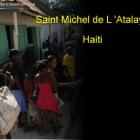ADVERTISEMENT
immigration
Immigration is a major issue among Haitian. It is estimated that over 4 million Haitians are currently living outside of Haiti
Haitian migrants in Dominican Republic lack documents to get legal status
Because Haiti suffers the reputation of being the poorest nation in the western hemisphere, it has spurred hundreds of thousands of Haitian migrants to cross over the border into the Dominican Republic (DR) seeking jobs. The DR, seeking to implement immigration control, has started a program to give resident status to Haitian migratory workers, who have been in the country prior to October 2011. The DR is asking for a Haitian identity card, passport, or birth certificate. The problem is the Haitian government's inertia in processing requests for the identity documents.
Haitians have not had an easy go of it in the Dominican Republic, but they direct their ire at Haiti's bungling bureaucracy. The immigration authorities are imposing a fee of $60 for a new birth certificate, voter ID, and passport. The fee is well beyond the means of migrant workers whose take-home pay amounts to only five dollars per day.
Why not a service to issue Haitian passports in Dominican Republic
Haitian Officials Urged to Document their Nationals for Dominican Republic Regularization Program. The Dominican Republic (DR) High Court issued a ruling last September 2013 that strips Haitian immigrants of citizenship, making them stateless. The international community has denounced the discriminatory action. Bowing to pressure from foreign governments, the DR said it would put into effect a National Plan of Regularization of Foreigners (PNRF), illegally residing in the DR.
One document Haitian immigrants need to register for the PNRF is a Haitian passport. But they are hard to obtain because the government of Haiti has relinquished the issuance of them to the Haitian Embassy in Washington, D.C. The time required to receive a passport from Washington can be up to three months.
Rush Limbaugh: Obama got 93 percent of Haitian Votes and doesn't need more
Sometime, it is a good thing to listen to the opposing view. We might learn something, even from someone like Rush Limbaugh, a radio host in the United States who is well known for his conservative views.
Someone from Miami recently called his show to ask him a question about the double standard that exists in the American immigration law when it comes to Haitian immigrants.
CALLER: I'd like to know why Mr. Obama is granting amnesty to all the immigrants that came over here illegally. When the Cubans come here, if they make it to land, they get to stay. However, for the Haitians, whether or not they make it to land, they get sent back.
Miami police to use high-tech cameras to fight crime in little Haiti
Crime in little Haiti in Miami has been reported to have increased. In this regard, Miami police are planning to install around 400 cameras in the city to reduce the rate of crime. These cameras will be able to zoom from long distance, something that will boost security surveillance. The police aim to apply this technology and make sure that they are able to follow people as they enjoy events in such areas as Biscayne Boulevard, Brickell,Overtown, Model City and in Little Haiti.
This complicated plan by the city police is expected to allow them to be able to watch about 200 closed-circuit television screens at once from a new high-tech command centre. In this program, there will be 25 high-definition, 55-inch television sets which will be fed by up to 400 cameras placed around the town, including Little Haiti.
An Answer to those who say Haitians should not risk their lives on Boat to reach the US
Once again, we have learned that some Haitian migrants perished at sea or as their body came ashore on the coast of Florida, the Bahamas or some islands near by. Often you hear: " The U.S. Coast Guard says an overloaded sailboat carrying migrants from Haiti has overturned and at least 10, 20 30, 40, 50,.... people have reportedly died.
Why do Haitians continue to risk their lives?
Has the information been published in Haiti, in the regions where those trips are being organized?
Do Haitian really know the risk?
They most pay those smugglers some good money. Why can't they use that same money to start a business in their own country instead?
Black Immigration Network Kinship Assembly In Miami's Little Haiti
A national organization that focuses on black immigration to the US, which has been in existence for 5 years, will conduct a three-day seminar in Little Haiti, Miami. The seminar's theme will be Black Immigration Network Kinship Assembly: A Gathering for Action.
During the conference, participants will also delve into racial justice, in addition to calling on the black immigrant diaspora to seek unity if it is to advance economically. Black Immigration Network will be the main hosts but will be assisted by various other groups.
The conference will run for three days, starting from May 23 to May 25. It will run during the same month when commemoration of the Haitian Heritage Month will be ending. More than 150 community leaders will take part in the conference.
Haitians Sentenced on Immigration Charge in Pointe-A-Pitre, Guadeloupe
Four Haitians involved in the illegal immigration network were arrested in Pointe-A-Pitre, Guadeloupe during the third week of March 2014. The four Haitians hauled by the official were Widberley Predestin (26), Jean Louis (33), Ismick Premier (35) and Jean Vil (36). They were sentenced by the Criminal Court of Pointe-à-Pitre (Guadeloupe) with terms varying 3 to 5 years.
The Border Police (PAF or Police de l'Air et des Frontières) has estimated that their network had landed more than 30 immigration landing operation involving 500 to 600 people (mainly Haitians and a few Dominicans) in the past one year. Their investigation suggests that these illegal immigrants have paid between US$ 4000 and US$ 5000 per trip from Hispaniola Island to the Dominican Republic. In addition, they had to pay US$ 200 to US$ 600 as passages between Dominica and South Basse-Terre (Guadeloupe). Thereafter, they used to pay further €50 to €100 before being taken into a house in Petit-Bourg where they could contact their family to bring more money, if needed.
Francois Guillaume II has new plan for Haitians Living Abroad
Francois Guillaume II is the new minister for Haitians living abroad (MHAVE). He had a meeting on Friday with Ministry staff. At this meeting he emphasised that everyone within MHAVE should be considered collaborators in a close and mutually respectful working relationship. There would be many challenges, but they would face them together.
The meeting was focused on the Haitian diaspora. Francois Guillaume emphasised the importance of the diaspora pointing out that the first minister of Haiti was one among this group. He stressed that members of the diaspora would collaborate with MHAVE to improve the image of Haiti overseas. He had a plan of action and list of objectives which included launching a campaign to improve Haiti's image abroad as well as carrying out a census of the distribution. Also, to ensure that members of the diaspora were kept informed of MHAVE's activities, representatives of the ministry would set up meetings and forums in every major city with a significant Haitian contingent to achieve this end. An agreement was expected to be signed with the Ministry of Foreign affairs.
Ex-DR President Leonel Fernandez Turns Moderate on Citizenship Debate
Should Haitian migrant children who were issued birth certificates be granted citizenship in DR?
Ex-Dominican Republic (DR) President, Leonel Fernandez, considering another run for the presidency, has taken a moderate approach to the citizenship issue that has made the DR unpopular in the international community. The Constitutional Court decision last September outlaws citizenship for Haitian descendents of illegal immigrants. The DR stipulates both parents must be Dominican for a child to be a legitimate DR citizen. Many Haitian-Dominican residents cannot access their birth certificates, being held hostage by the government.
Leonel Fernandez says the government shouldn't have legitimized the births of Haitian descendents, but now it is too late. He adds, "We should . . . recognize it--the Dominican nationality of all those, who already have birth certificates." His position makes him seem a supporter of Haitians' citizenship rights. But in the streets outside a West Palm Beach economic forum Fernandez attended, Haitian-American protestors see through his guise. They know his moderate view is only for political gain.
Bahamas, Haiti Join in Combating Illegal Migration
To tackle the problem of stopping illegal migration from Haiti to The Bahamas, the Haitian and Bahamian governments met to discuss solutions. Fred Mitchell, U.S. Minister of Foreign Affairs and Immigration (FAI), and his representatives attended the bi-lateral meeting as observers. The dual purpose of the meeting was to reduce numbers of illegal immigrants traveling to The Bahamas and encourage more trade.
One strategy the two governments decided to put into practice is to implement a citizens' awareness program in northern Haiti. It will inform people, if they are discovered engaging in human trafficking activities, they will be arrested and returned to Haiti. To strengthen the two governments' resolve in reducing illegal migration from Haiti to The Bahamas, they are ramping up their military intelligence capacity.
Our objective is to share with you news and information about Haiti and the people of Haiti. Traditions, habits and the way we were or grew are alive in this site. We highly recommend that you Subscribe to our Newsletter and also share with us some of the things that are memorable and made us unique people.

 Haitian Thanksgiving
Haitian Thanksgiving  Black Friday Shopping Season
Black Friday Shopping Season  Saint Michel de L 'Atalaye
Saint Michel de L 'Atalaye  Newsletter
Newsletter  La Chapelle, Haiti
La Chapelle, Haiti